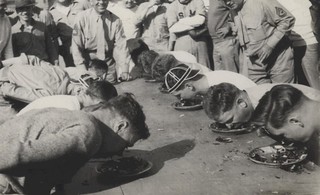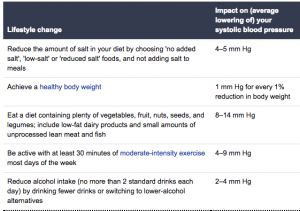Guyside: feeling tension over hypertension
Guyside: the power of ritual
 I’ve mentioned in a previous Guyside that my mother died in August. And yesterday, my brother and I were informed that her house — our house — had sold. For me, it’s been an odd experience. It’s a home my grandfather built in the ‘teens and twenties in a small coal-mining town. My mom and her siblings grew up in that house; after getting married, my dad moved in, and my two brothers and I grew up there. Soon, I’ll be flying home (an ironic phrase, now) to do the final paperwork and hand off the house to its new owner.
I’ve mentioned in a previous Guyside that my mother died in August. And yesterday, my brother and I were informed that her house — our house — had sold. For me, it’s been an odd experience. It’s a home my grandfather built in the ‘teens and twenties in a small coal-mining town. My mom and her siblings grew up in that house; after getting married, my dad moved in, and my two brothers and I grew up there. Soon, I’ll be flying home (an ironic phrase, now) to do the final paperwork and hand off the house to its new owner.
Guyside: Fall food thoughts that aren’t hard to swallow.

This may or may not resemble your humble columnist at a barbecue.
Fall is a wonderful season. If you live in a climate where heat and humidity dominate summer, you start to feel relief. Autumn colours make the world beautiful. And (at least for me), food begins to change along with the season.
I love to grill food, and in our household, we take advantage of warm summer days to cook and eat outside as much as we can. But as days get shorter and cooler, we start to move the cooking inside, and that changes the nature of the dishes that get prepared too.
It’s already known that men tend to eat less healthily than women. And It’s really easy for men (and by men I mean me) to enjoy the grilling season a little too much. Sausages, thick steaks, ribs, rich barbecue sauces and the like are great in moderation, but easy to overdo. Even some of the salads I associate with summer have rich dressings that might reduce the benefits of all those healthy veggies. And none of this even begins to address some of the junky food that we eat as the day goes on.
I try to take fall as a sign to revisit what I eat a little bit. I’m not going to go macrobiotic or vegan, but it’s never a bad thing to examine your food choices every so often. Here’s some of the things I do:
- I’m the main cook in our household, so I do a few simple things to make food both good and healthy when shorter days come. I shop from a list, and stock up on basics that I know will get used up over time without going bad. If I’m making a dish that requires some perishable ingredient, I find other dishes to make that will use up that ingredient. For example, I made a pork curry on the weekend that needed ginger root. So during the rest of this week, there’s also a chicken tikka recipe that used ginger root and tonight is pork chops marinated in ginger.
- I try and make some healthy substitutions of ingredients or techniques where I can. Rather than white rice, I’ll use brown rice, or even better, brown basmati rice. Rather than make French fries in a skillet, I do ‘em in the oven. I’ll also switch up sweet potatoes for plain old potatoes. And I try to make things like marinades, dressings, and the like from scratch rather than use store-bought ones. It’s usually cheaper and better.
- The biggest additions to the menu in the fall are soups and slow-cooker meals. Soups or slow-cooker dishes usually mean multiple days are covered, making for stress-free cooking days if my partner and i are busy, and scratch soups are pretty simple to make. Nutritious and delicious works for me.
My big weakness? Lunches. I work from home, so I get to make lunches rather than eat out every day, but my instincts are to have a canned soup (lots of sodium) or a sandwich (processed meat); not always the best choices. So perhaps this fall I’ll try to do better with my lunch choices.
Maybe it’s time for you to take a look at what you cook and eat.
Photo: CC-licenced from the US Marine Corps Archives on Flickr.
Read MoreGuyside: Men, health, and denial.
 I can’t believe I’m writing a post here inspired by Rob Ford. And yet, here I go.
I can’t believe I’m writing a post here inspired by Rob Ford. And yet, here I go.
This is not about Rob Ford’s politics, or about his consumption of various substances both licit and il. This is about male denial around health issues. The famous (notorious?) mayor of Toronto’s 2014 re-election campaign was derailed by the announcement that a tumour had been discovered in his abdomen on September 9. The tumour is, apparently, being analyzed in preparation for treatment at a Toronto hospital.
One of the things that leapt out at me from the first stories about this latest roller-coaster development in the Ford story was this quote from a story in the Toronto Star:
Ford was complaining of “left, lower quadrant abdominal pain” for three months before the pain became “unbearable” Wednesday morning, Devlin said.
Since the initial tests on Ford, he’s also apparently had a lung biopsy, and an update on his health is expected later today (September 17, as I write this.)
Combine this with two other facts: one, that Ford’s father died in 2006 of colon cancer, and two, that Ford had a tumour on his appendix in 2009 that necessitated the removal of his appendix and part of his colon, and you have what appears to be the classic case of a man refusing to seek medical assistance. I’m no psychic, but I don’t have a good feeling about this.
In this, Ford is far from alone. A 2005 literature review in the Journal of Advanced Nursing showed that men are much less likely to seek medical help than women for disorders ranging from psychological disorders to physical disabilities. One UK study identified men’s refusal to seek help as the most important medical issue for men. And another UK report points out that while men are considered “advantaged” in many areas (salaries, for example), our health outcomes are worse than women’s.
Whether it’s machismo, stoicism, putting work or other factors before health, or something else, too many men are ignoring symptoms, assuming they’ll go away, or simply lying to themselves about their health. And it’s costing people their lives. One of the saddest findings of the Men’s Health Forum report is that when men do present themselves for assistance, the disease in question is too often at a later, more serious stage. Another sad fact is that men are far less likely to seek assistance for psychological conditions like depression.
When I first saw blood in my urine in 2006, I did two things: told my partner and went to my clinic. My bladder cancer was discovered at an early stage, and I’ve been lucky enough to not require radiation, chemo, or catheterization from more severe forms of cancer. If I’d shrugged off that first sign, what might have happened?
For your own sake, and the sake of those who love you: go to your doctor, your nurse-practitioner, or whatever other health professional you ought to go to, especially when something unusual happens.
Creative Commons-licenced photo by Flickr user Alistair Gilfillan.
Read MoreGuyside: a little personal history through wartime mail
Graves at the Canadian War Cemetery at Bergen-op-Zoom, Netherlands, where my uncle Bill is one of 1,047 Canadians buried.
Since I’ve been lucky enough to be born in Canada, and since I chose not to enlist in our armed forces in my life, I’ve never experienced war. But there is lots of service in my family. My brother collected a pension after a career in the Canadian Forces; my father piloted a Sherman tank through Holland and Belgium in 1944 and 1945; his brother landed on Juno Beach in Normandy and fought the European campaign all the way through; and two of my mother’s brothers joined up for WWII. Sadly, only one of them came back. And that’s really where this story begins.
My mom died on August 29. She was 89. And part of the family mythology that I grew up with was Uncle Bill. When we went to our summer cottage, she’d remember how Bill would swim from one shore all the way across the lake and back (a swim I was never fit enough to manage, likely two miles or more), worrying my grandmother greatly.
He commanded shore defences in Cape Breton, where my family was from, and gave up a commission so he could go overseas. A land mine grievously injured him, and he died at the age of 33, a bachelor, in Belgium, October 26, 1944. He was buried in a Commonwealth cemetery in Holland.
As my brother and I and our partners prepared my mother’s house for being vacant for a while (neither of us live close by), we came upon a few stacks of letters in the basement, sent by my mother’s uncles from 1942-1945, and a number of other things that related to their service. I’ve barely scratched the surface of the letters so far, but they are remarkable. First, the quantity of letters that Bill produced was amazing for a modern person, who puts pen to paper occasionally at best. He wrote to his parents, to his sisters, to his brother, and probably to friends as well.
Second, the tone of the letters. Ones to my mother, his baby sister, are teasing and affectionate. He calls my mom “Ebby” or “Eb”, a play on words for her name, Evelyn. He teases his other sisters as well, but reserves a more respectful tone for his parents, my grandparents, although he teased them on occasion too. He appeared to have a pretty good handle on what would be censored, because there are only a few passages cut or blotted out. And, likely in part because soldiers were told to be positive in their letters home, he was almost entirely positive, rarely speaking even of the minor difficulties of wartime life, deprivations, cold, wet. His biggest complaint was lack of mail from his family, and it seems his biggest hobby throughout his war was girls.
As I delve into these letters, I’m beginning to see why my mother mythologized my uncle. To use the parlance of the time, his letters paint him as a “really swell fellow — simply grand.” I would love to have had the opportunity to meet him, but we missed each other by 22 years. And I am again struck by the differences — at least the superficial ones — between the men of that time and the men of our time. My father’s uncle Cam, a veteran of the entire European campaign never shared his war experiences with anyone, to the family’s knowledge, and it never seemed to have affected him. It feels as if the men of that generation returned from a global conflict and got on with life. I think I could take a lesson or two from the men of that time in simply getting on with things.
Were the men of that time perfect? Undoubtedly not. They were products of a different time. Some of the attitudes and behaviours not even noticed back then would be considered abhorrent today. But it’s kind of neat to be given the opportunity to glimpse through a window into your family’s history, to imagine meeting a long-since-lost man in your family, to hope that you would find him up to your expectations, and that you would meet his.
Photo credit: The Commonwealth War Graves Commission.
Read More






